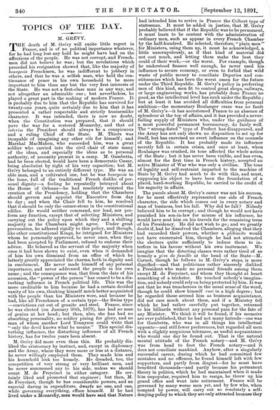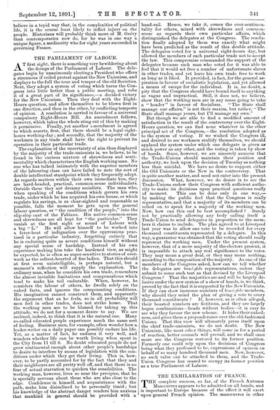TOPICS OF THE DAY.
M. GRt VY. THE death of M. Grevy will excite little regret in France, and is of no political importance whatever, for he had long lost any hold he might have had on the affections of the people. He was not corrupt, and French- men did not believe he was ; but the revelations which preceded his resignation showed that, like the majority of bourgeois Frenchmen, he was indifferent to jobbery in others, and that he was a selfish man, who held the con- tinuance of peace in his own household to be more important to him than any but the very first interests of the State. He was not a first-class man in any way, and not altogether an admirable one ; but nevertheless, he played a great part in the making of modern France. It is probably due to him that the Republic has survived for twenty-one years, quite certainly due to him that it has presented a rather respectable and strictly businesslike character. It was intended, there is now no doubt, when the Constitution was prepared, that it should pave the way for a restored Monarchy, and that ad interim the President should always be a conspicuous and a ruling Chief of the State. M. Thiers was incapable of imagining any other role for himself ; and Marshal MacMahon, who succeeded him, was a great soldier who carried into the civil chair of state many of the ideas, and especially the ideas as to personal authority, of necessity present in a camp. M. Gambetta, had he been elected, would have been a democratic Ccesar, being absolutist by right of his very capacities; but M. Grevy belonged to an entirely different type. He was an able man, and a cultivated one, but he was bourgeois to the bone, full of the traditional French dislike of per- sonal dignity—a feeling he repeatedly betrayed about the House of Orleans—he had resolutely resisted the creation of the Presidency, holding that the Chambers should govern and appoint the Executive from day to day ; and when the Chair fell to him, he resolved that it should be only the corner-stone in the constitutional edifice. He would neither command, nor lead, nor per- form any function, except that of selecting Ministers, and carrying out the policy upon which they and a shifting majority in the Chambers might agree. Under great provocation, he adhered rigidly to this policy, and though, like other constitutional Kings, he intrigued. for Ministers whom he personally approved, he never once, when they had been accepted by. Parliament, refused to endorse their advice. He behaved as the servant of the majority when once it had been shown to exist, even when it demanded of him his own dismissal from an office of which he latterly greatly appreciated the charms, both in dignity and in emolument. He never made himself of any personal importance, and never addressed the people in his own name ; and the consequence was, that from the date of his accession, the " power of the person " has ceased to be a dis- turbing influence in French • political life. This was the more creditable to him because he had a certain decided vanity of his own, thinking himself much better acquainted with the people than his Ministers were, and because he had, like all Frenchmen of a certain type—the Swiss type —convictions cut out of granite and steel. France, since he was elected (on January Nth, 1879), has had no man of genius at her head ; but then, also, she has had no absorbing personality, no soldier pining for glory, and no man of whom another Lord Tennyson could write that " only the devil knows what he means." This special dis- turbing influence, the disturbing influence of all French history, has for twelve years been absent.
M. Grevy did more even than this. He probably dis- liked the aristocracy by instinct, and, except in diplomacy and the Army, -where they were more or less at a distance, he never willingly employed them. They made him and his household look too homely. He dreaded, too, the competition of very strong or very brilliant men, and he never summoned any to his side, unless we should count M. de Freycinet in either category. He cer- tainly liked and promoted that engineer; but then, M. de Freycinet, though he has considerable powers, and an especial daring in expenditure, dwarfs no one, and can, while governing everything, efface himself. If he had lived under a Monarchy, men would have said that Nature had intended him to revive in France the Colbert type of statesman. It must be added in justice, that M. Gr6vy probably believed that if the Republic was to be permanent, it must learn to be content with the administration of ordinary men, such as appear in every French Chamber by the half-hundred. He selected, therefore, " plain men" for Ministers, using them up, it must be acknowledged, a, little unscrupulously, as if that kind of material did not cost much, and letting them make the best they could of their work,—or the worst. For example, though he understood finance well enough, he never used his influence to secure economy, or even to forbid that wild waste of public money to conciliate Deputies and con- stituencies which has been the worst omen for the future under the Third Republic. M. Grevy's policy in preferring men of this kind, men fit to control great shops, railways, or large engineering works, has probably done France no good, as the intellectual level has sunk under the Republic ; but at least it has avoided all difficulties from personal ambition—the momentary Boulanger craze was no fault of M. Grevy's—it has accustomed France.to an absence of splendour at the top of affairs, and it has provided a never- failing supply of Ministers who, under the guidance of. a most powerful permanent bureaucracy, do fairly well. The " strong-fisted " type of Prefect has disappeared, and the Army has not only shown no disposition to set up for itself, but has exercised no overt influence on the counsels of the Republic. It has probably made its influence secretly felt in certain crises, and once at least, when Boulanger was crushed, its tone affected the whole action of the State ; but it has never been visible, and has even, almost for the first time in French history, accepted an active Minister of War who was only a civilian. The tone of legality and self-restraint imparted to the machine of State by M. Grevy had much to do with this, and must, supposing his object to have been the foundation of a placid, hard-working Republic, be carried to the credit of his sagacity in affairs.
The puzzle about M. Grevy's career was not his success, for he most effectively represented one side of French character, the side which comes out in every notary and man of business, but his fall. Why did he fall P Nobody believed him to be corrupt ; and though he would not have punished his son-in-law for misuse of his influence, he would have sent him on his travels for the remaining term of his Presidency. He did not wish to go ; and we greatly doubt if, had he dissolved the Chambers, alleging that they had exceeded their powers, whether a plebiscite would not have exonerated him, though he had not attracted the electors quite sufficiently to induce them to in- terfere in, his favour without his own incitement. We imagine that the directing classes were rather tired of so homely a pore de famine at the head of the State—M.. Carnot, though he follows in M. Grevy's steps, is more dignified—and that politicians rather sincerely disliked a President who made no personal friends among them. except M. de Freycinet, and whom they thought at heart something of a trickster. He touched nobody's imagina- tion, and nobody could rely on being protected by him. It was not that he was treacherous in the usual sense of the word, though he could show himself ruse in a high degree ; but he regarded those around him as business acquaintance, did not care much about them, and if a Ministry fell which he had rather carefully put together, returned to his billiards without any personal pain for the fate of any Minister. We think it will be found, if his memoirs are ever published, that he had not many hatreds—one was for Gambetta, who was in all things his intellectual opposite—and still fewer preferences, but regarded all men with a slightly suspicious tolerance, as useful acquaintance who would one day be found out. That is the natural mental attitude of the French notary—and M. Grevy was from head to foot the French notary—and it does not conciliate mankind. Anyhow, after a singularly successful career, during which he had committed few mistakes and no offences, he found himself left with few supporters, and partly from disgust—for he must have benefited thousands—and partly because his permanent theory in politics, which he had maintained when it made him unpopular, required him to resign, he threw up his grand office and went into retirement. France will be governed by many worse men yet, and by few who, when tempted by power, will carry out so resolutely a self- denying policy to which they are only attracted because they believe in a tepid way that, in the complexities of political life, it is the course least likely to inflict injury on the people. Historians will probably think more of M. Grevy than contemporaries now do, for he was in one way a unique figure, a mediocrity who for eight years succeeded in governing France.



































 Previous page
Previous page